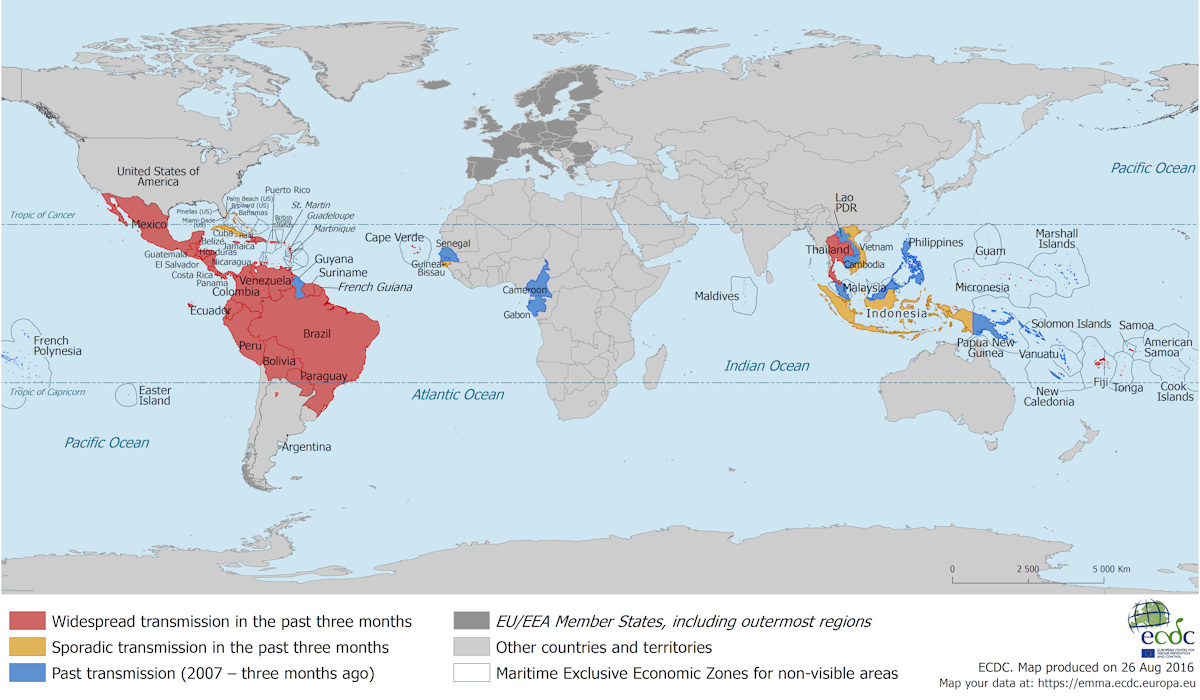Zika Virus & Your Vacation
The information on current Zika transmission is useful to evaluate the risk for people who have recently returned from or are planning to travel to countries with active local transmission. Countries and territories are categorized as currently experiencing active local Zika virus transmission if local Zika infections have been reported by health authorities within the last three months.

Countries Where Zika Has Been Active
American Samoa
Anguilla
Antigua and Barbuda
Argentina
Aruba
Barbados
Belize
Bolivia
Bonaire
Brazil
Cayman Islands
Colombia
Costa Rica
Cuba
Curacao
Dominica
Dominican Republic
Ecuador
El Salvador
Fiji
French Guiana
Grenada
Guadeloupe
Guatemala
Guyana
Haiti
Honduras
Jamaica
Kosrae, Federated States of Micronesia
Marshall Islands
Martinique
Mexico
New Caledonia
Nicaragua
Panama
Papua New Guinea
Paraguay
Peru
Puerto Rico, US territory
Saba
Saint Barthélemy
Saint Lucia
Saint Martin
Saint Vincent and the Grenadines
Singapore
Samoa
Sint Eustatius
Sint Maarten
Suriname
The Bahamas
Tonga
Trinidad and Tobago
Turks and Caicos
U.S. Virgin Islands
United States
Venezuela
How to prevent Zika
There is no vaccine to prevent Zika. The best way to prevent diseases spread by mosquitoes is to protect yourself and your family from mosquito bites. Here’s how to lessen the risks:
Clothing
Wear long-sleeved shirts and long pants.
Treat your clothing and gear with permethrin or buy pre-treated items.
Insect repellent
Use insect repellents with one of the following active ingredients:
DEET, picaridin, IR3535, or oil of lemon eucalyptus or para-menthane-diol.
When used as directed, these insect repellents are proven safe and effective even for pregnant and breastfeeding women.
Do not use insect repellents on babies younger than 2 months old.
Do not use products containing oil of lemon eucalyptus or para-menthane-diol on children younger than 3 years old.
Mosquito netting
Stay in places with air conditioning and window and door screens to keep mosquitoes outside. Take steps to control mosquitoes inside and outside your home.
Mosquito netting can be used to cover babies younger than 2 months old in carriers, strollers, or cribs.
Sleep under a mosquito bed net if air conditioned or screened rooms are not available or if sleeping outdoors.
Sexual transmission
Prevent sexual transmission of Zika by using condoms or not having sex.
To protect travelers from Zika travel experts and disease scientists are monitoring the status of Zika in countries around the world and making appropriate travel recommendations. These recommendations are based on a number of factors, including the historical or current presence of Zika in the country. Based on this assessment, areas with Zika are classified as epidemic or endemic.
Epidemic: These countries are currently experiencing outbreaks of Zika, and travel notices have been posted to alert travelers, particularly pregnant women, of the risk. These countries are considered epidemic because
The mosquito that carries Zika virus is present,
Zika has not been reported there in the past, and
Very little, if any, of the population is likely to be immune.
When Zika is first introduced into a country, it generally spreads quickly through the population. Over time, as the outbreaks decrease, these countries will change from the “epidemic” to the “endemic” classification, and travel notices will be removed.
Endemic: These countries have reported cases of Zika in the past and may occasionally report new cases. A large number of local residents are likely to be immune, so occasional cases may occur but generally not in numbers large enough to be considered an outbreak. Because the risk to travelers is likely much lower in these countries than in epidemic countries, travel notices will not be posted unless the number of cases rises to the level of an outbreak.